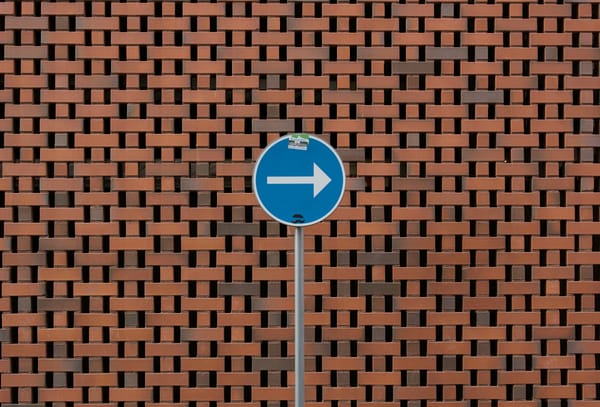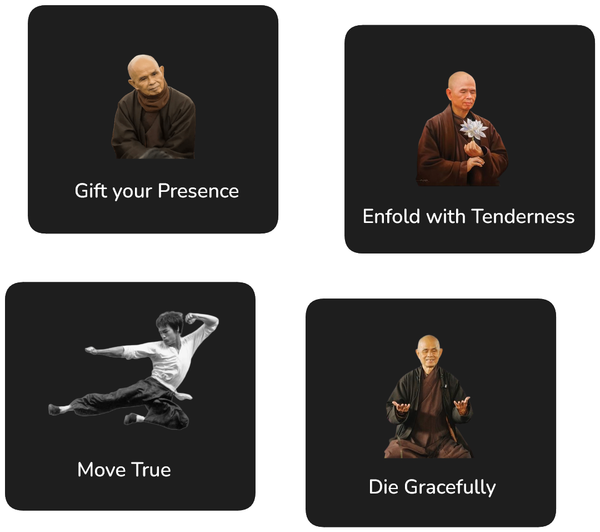On Waiting: A Skill Often Overlooked
Waiting seems like a waste of time. I argue it is actually one of the most powerful things we can learn.

Waiting is becoming an increasingly dreaded aspect of our lives. We live in an era that seeks to minimise waiting wherever possible, driven by our growing intolerance for delays and need for instant gratification. However, is waiting really something that is inherently undesirable and should be avoided? Inspired by Herman Hesse's timeless novel, Siddhartha, this article delves into the art of waiting and how it can be harnessed as a powerful tool for personal growth and enlightenment.
Waiting encompasses various dimensions, ranging from the trivial to the profound. In earlier times, humans had to endure lengthy periods of waiting, whether for news, transportation, or the fulfilment of desires. While our modern world has made significant strides in reducing wait times, our growing impatience has shifted the focus from embracing the act of waiting to the art of avoiding it. Take the departure lounge of an airport for example; who rejoices at the announcement of a flight delay?
I believe this adversity to waiting is fundamentally misguided, and will argue for the value in waiting itself in the following.
Siddhartha's Insight: Waiting as a Skill
In Hermann Hesse's novel Siddhartha, the eponymous protagonist embarks on a spiritual journey in search of truth and self-realisation. During his pursuit, Siddhartha encounters various teachers and life situations. When the merchant Kamaswami asks the young monk Siddhartha what skills he possesses, Siddhartha responds, "I can think, I can wait, I can fast."
Kamaswami questions the usefulness of these skills, and Siddhartha explains the benefits of fasting:
When a person has nothing to eat, fasting is the smartest thing he could do. When, for example, Siddhartha hadn’t learned to fast, he would have to accept any kind of service before this day is up, whether it may be with you or wherever, because hunger would force him to do so. But like this, Siddhartha can wait calmly, he knows no impatience, he knows no emergency, for a long time he can allow hunger to besiege him and can laugh about it. This, sir, is what fasting is good for.
Siddhartha also explains how thinking, waiting and fasting enable him to reach his goals to the courtesan Kamala:
When you throw a rock into the water, it will speed on the fastest course to the bottom of the water. This is how it is when Siddhartha has a goal, a resolution. Siddhartha does nothing, he waits, he thinks, he fasts, but he passes through the things of the world like a rock through water, without doing anything, without stirring; he is drawn, he lets himself fall. His goal attracts him, because he doesn’t let anything enter his soul which might oppose the goal.
Bruce Lee, the well-known actor and martial artists, applies a similar idea to hand-to-hand combat - not something we would usually associate with waiting:
When the opponent expands, I contract. When he contracts, I expand. And, when there is an opportunity, I do not hit — it hits all by itself.
These insights demonstrate that waiting is far from being an unproductive, passive activity; instead, it is a crucial skill that can help us achieve our goals and succeed in life.
Patience as a Virtue
While there is scant discussion on waiting as a skill or virtue, there is plenty of discussion on the subject of patience. In the following, I will briefly review patience as a virtue from the perspective of Aristotle, the Stoics and David Hume.
The Nicomachean Ethics, a keystone work by Aristotle on the art of living well or good life proposed that virtues exist as the mean between two vices, excess and deficiency, and are achieved through practical, rather than theoretical action. Within this framework, patience as a virtue can be viewed by its relative association with the virtue of temperance (sōphrosunē) and gentleness (praótēs), concerning our reactions to pleasure, pain, and anger.
Temperance is described as a measure of moderation, particularly in the face of pleasure and desires. Patience can be seen as a key aspect of temperance, where one refrains from immediate or excessive indulgence in bodily desires such as food, drink, or sex. The virtue of patience can be seen as the skill to hold and control these impulses, to desire in a manner that does not exceed what is healthy, beautiful, or within one's means. A temperate person, inclined to patience, lives in alignment with the right reason, or orthos logos, and as such, is not easily pained in the face of ungratified desires.
The other aspect of patience from an Aristotelian perspective relates to how one deals with anger, under the virtue of gentleness or praótēs. A gentle, patient individual does not get easily angered or irritable and displays good temperance. This, however, does not mean that one should avoid anger completely. Aristotle suggests that anger can have a virtuous and rational place within one's behaviour; the art lies in managing it "on the right grounds and against the right persons, also in the right manner and at the right moment and for the right length of time". This again implies an exercise of patience, of waiting for the right conditions before expressing anger, and even erring on the side of forgiveness.
Stoic philosophers regarded patience as a vital virtue in leading a tranquil and virtuous life. Patience, or hupomonē in Greek, was highly valued by Stoics such as Epictetus, Seneca, and Marcus Aurelius. They believed that patience involved enduring life's challenges and setbacks with inner strength and resilience, and it played a fundamental role in achieving wisdom, self-mastery, and tranquillity of mind.
No greater thing is created suddenly, any more than a bunch of grapes or a fig. If you tell me that you desire a fig, I answer you that there must be time. Let it first blossom, then bear fruit, then ripen.
— Epictetus
For Stoics, patience meant accepting and embracing the inevitable hardships and adversities of life without complaint or resistance. They recognised that many things in life were beyond their control, and patience allowed them to navigate these circumstances with equanimity. Stoics emphasised that patience should not be mistaken for passivity or indifference, but rather as a deliberate and conscious choice to respond to life's trials with rationality and composure.
David Hume, an influential figure of the Scottish Enlightenment, also discusses virtues that mirror the "ancients", where character and virtuous behaviours are paramount. We can infer that Hume may see patience as a necessary virtue within this framework. Patience encompasses many of the virtues Hume espouses, such as prudence, temperance, and good sense. Therefore, it is not illogical to suggest that Hume would see patience as an important part of virtuous conduct.
In summary, patience, a virtue closely intertwined with waiting, empowers us to navigate the uncertainties of life with grace and equanimity. However, waiting offers further utility beyond merely getting better at enduring life's hardships. To explore this further, let me next look at the connection between waiting and the practice of mindfulness.
Waiting and Mindfulness
“Why is patience so important?” “Because it makes us pay attention.”
— Paulo Coelho
Mindfulness is a practice that involves bringing one's attention and awareness to the present moment. It is a state of active, open attention to the present, without judgement or attachment to any particular outcome. With that, mindfulness is a powerful practice to help us embrace waiting
When we wait, our minds tend to drift into the future, fixating on the desired outcome or the completion of the waiting period. This mental projection can generate anxiety and impatience, making the wait seem unbearable. Mindfulness encourages us to shift our attention away from the future and onto the present moment. By directing our awareness to our breath, bodily sensations, and immediate surroundings, we ground ourselves in the here and now, alleviating the restlessness associated with waiting.
Mindful waiting empowers us to find beauty, stillness and joy even in the midst of apparent stagnation. Beyond this practical application of mindfulness for alleviating the suffering of waiting, waiting and mindfulness also help us explore deeper philosophical questions, as I will discuss in the next section.
Impermanence and Detachment
When we patiently wait, we acknowledge the impermanence of the present moment, surrender our expectations to the unfolding of time, and find solace in the understanding that change is an inherent part of life.
Waiting often revolves around the desire for something yet to come—a desired outcome, a change, or a resolution. However, the essence of waiting lies in embracing impermanence and relinquishing attachment. By recognising the transient nature of all things, we can release our grip on expectations and surrender to the flow of life.
The Buddha taught that everything is impermanent — flowers, tables, mountains, political regimes, bodies, feelings, perceptions, mental formations, and consciousness.
— The Heart of the Buddha's Teachings - Thich Nhat Hanh
In this surrender, we discover liberation from the restlessness that arises from clinging to specific outcomes. Waiting becomes a space of surrender and acceptance rather than an endurance test.
This too shall pass.
Conclusion
Waiting can be a profound teacher, imparting invaluable lessons along our journey of life. It reveals the importance of resilience, teaching us to endure challenges with patience and fortitude. It fosters humility, reminding us of our place in the grand tapestry of existence. By reframing waiting as a valuable process rather than an inconvenient pause, we can transform our experience of time itself.
In a world that constantly urges us to rush, achieve, and minimise waiting, the art of waiting stands as a counterbalance—an invitation to slow down, reflect, and embrace the beauty of the present moment. From the mundane to the profound, waiting holds the potential for personal transformation and enlightenment. By cultivating patience, practising mindfulness, embracing impermanence, and extracting wisdom from the experience of waiting, we can navigate life's journey with grace and equanimity. As Siddhartha exemplifies, the ability to wait is not a passive act but an essential skill that invites success, self-discovery and spiritual growth.





